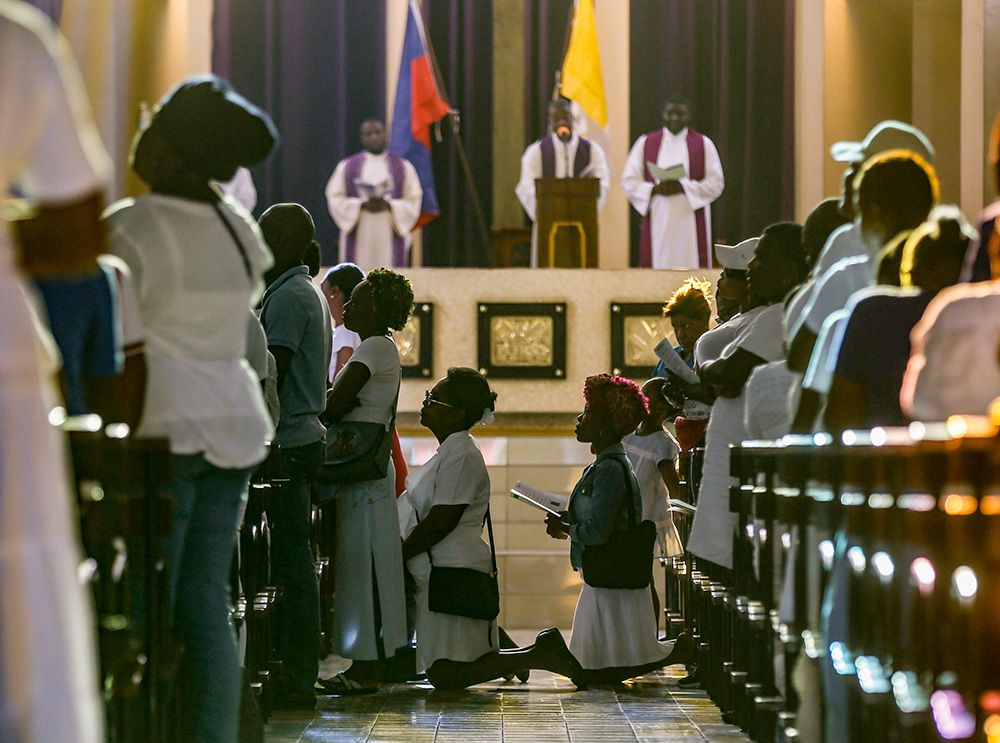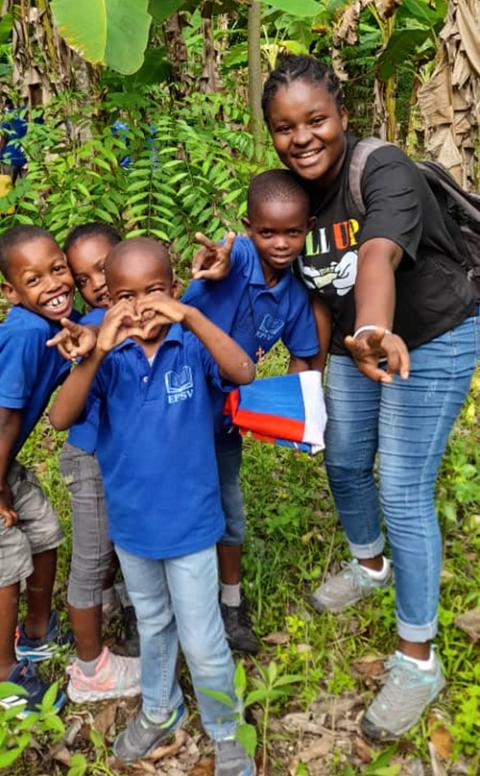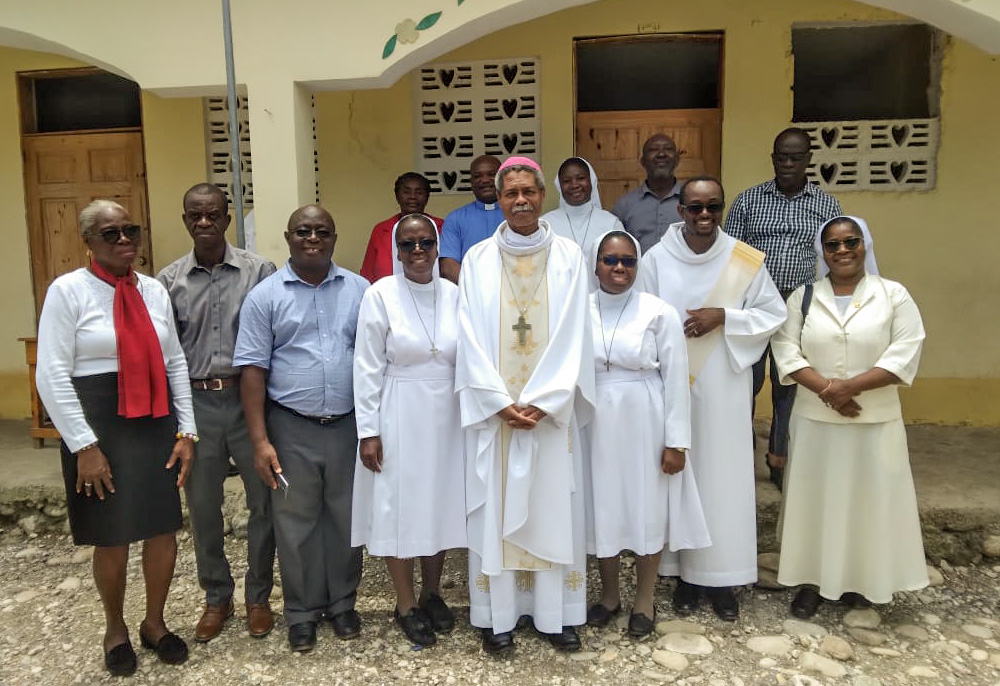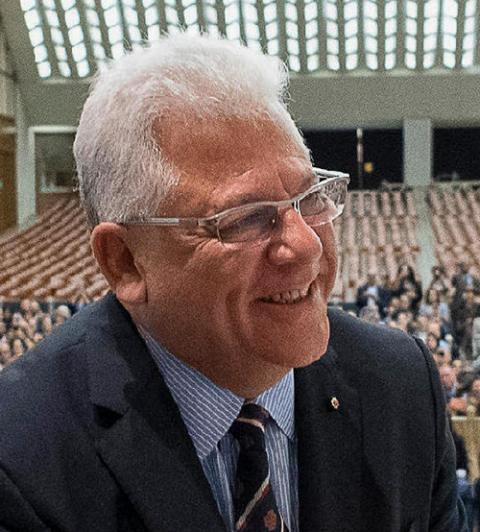
Faithful kneel in prayer during a Good Friday service at St. Pierre Catholic Church in the Pétion-Ville neighborhood of Port-au-Prince, Haiti, on March 29. (AP/Odelyn Joseph)
Bishop Joseph Gontrand Décoste of Jérémie, Haiti, hung a sign behind the desk of his small office in his diocese that reads, "Providentia providebit," which in Latin means that "providence itself will provide for the needful."
It was the motto coined by sainthood candidate Mother Mary Lange, a Haitian-born nun who after migrating to Baltimore in 1829 founded the Oblate Sisters of Providence, the first congregation for African American women who dedicated themselves to serving orphans and educating Black children, while slavery was still legal in Maryland.
The Catholic Church in Haiti has also been living for more than 10 months across its 10 dioceses solely on providence, Décoste told NCR during a recent video interview.
On the morning of the call, a woman from Jérémie, a province in Haiti's southwest, had gone to ask Décoste if he could help her in any way to send any form of aid to her children — high school and university students — who have been stranded in the capital Port-au-Prince without food or money for days.

Children in the Diocese of Jérémie, Haiti (Courtesy of Joseph Gontrand Décoste)
"She came to me, and I couldn't give her any money, but I said to her some words of hope and courage, to help her move on and to continue to fight for her children," Décoste said. "It shows us how life for people in Haiti is really difficult, mainly for children, women and vulnerable people."
Over the past year, Haiti has seen staggering internal displacement, with more than 360,000 people forced to flee their homes, driven out by escalating gang violence that has gripped the nation, in particular in Port-au-Prince. The situation, as described by the U.N.'s International Office for Migration, is rapidly deteriorating, with the number of internally displaced persons expected to surpass 400,000 by the end of the summer. The epicenter of this crisis lies in the capital and its surrounding neighborhoods, where more than half of the displaced have sought refuge.
Since the assassination of President Jovenel Moïse in 2021, Haiti's gangs have expanded their reign of terror, seizing territory and intensifying their acts of violence.
Recent developments have seen gang leaders assert control over key aspects of the nation's governance, pushing for the resignation of Prime Minister Ariel Henry in March and advocating for systemic changes aimed at tackling poverty and corruption. However, their demands include controversial requests for amnesty for their criminal activities, and resistance against the deployment of an international security force led by Kenya.
The United Nations reported a 53% increase in casualties due to gang violence during the first quarter of 2024 compared to the previous reporting period. The violence reached a critical point in late February when rival gangs orchestrated coordinated attacks on police stations, jails and even the airport, prompting widespread panic and causing entire neighborhoods of Port-au-Prince to empty out as residents fled for safety.
On Feb. 18, Haitian Bishop Pierre-André Dumas of Anse-á-Veau and Miragoâne, vice president of the Episcopal Conference of Haiti, was also the victim of an attack in his home, as a result of which he is still hospitalized in Miami. The previous month, six Haitian religious sisters of the St. Anne Congregation had been kidnapped in Port-au-Prince and released on Jan. 25 after a week in captivity in exchange for ransom.
According to Décoste, however, the people of Haiti are still living in hope.
"While in Haiti everything seems to be collapsing, and collapsing miserably at all levels, the Catholic Church is one of the few institutions in the country that remains standing strong, still, solid as the last sign of hope for the Haitian people, whom it accompanies as much as it can," he said.
Despite the economic difficulties, Décoste said gangs have not yet been able to penetrate the social fabric in south and west Port-au-Prince, but that due to the unrest caused by the absence of an effective system of law and order, Haiti's 10 Catholic bishops have not been able to meet in person for the past five years, holding their thrice-yearly meetings on Zoom.

Bishop Joseph Gontrand Décoste of Jérémie, Haiti, with local diocesan priests and nuns (Courtesy of Joseph Gontrand Décoste)
"The Catholic Church in Haiti today is the only institution in the country that has not collapsed," Jean Lucien Ligondé, president and CEO of the Haitian Center for Research in Planning and Development (CHRAD S.A.), told NCR.
"The Catholic Church of Haiti fights daily to maintain the faith despite its poor financial resources, but the faith of the Haitian people is a testimony to the world," said Ligondé, describing how "laypeople, despite of the insecurity, extreme poverty, continue to attend their parishes or practice their faith in family or in small community."
The Haitian Center for Research in Planning and Development is a Haitian think tank composed of lay Catholic experts and researchers in human and economic development. Ligondé, an entrepreneur in local industrial shoemaking who studied in the United States and Canada, is also a co-founder of the Catholic University Notre Dame of Haiti.
"As a researcher, with my partners we anticipated the arrival of this collapse of the social order and the state," Ligondé said. "CHRAD S.A. had submitted a plan to the Episcopal Conference of Haiti, in anticipation of what happened and that we are experiencing today."
Advertisement
Décoste said that each bishop of Haiti has a copy of the plan, which was initially designed in 2017, and that the real challenge for the future is to collect the money necessary to implement it as soon as possible.
"We need the support of all Catholic churches throughout the world, mainly in the USA," he said. "We are so grateful to the Catholic Church in the USA."
Mario Paredes, founder and chairman of the board of the Catholic Association of Latino Leaders and former vice president of business development at Merrill Lynch, traveled to Haiti multiple times with the late New York Cardinal John O'Connor, supporting Ligondé's work both in establishing the university and with his think tank.
On May 4, the association held a high-profile webinar to discuss priorities for the future of Haiti in the tragic current context. The webinar was attended by Vatican Secretary of State Cardinal Pietro Parolin; the Vatican's ambassador to the U.S., Cardinal Christophe Pierre; the vice president of the Haitian bishops; and three former leaders in the region, namely Felipe Calderón Hinojosa from Mexico, Eduardo Frei Ruiz-Tagle from Chile and Miguel Ángel Rodríguez from Costa Rica.
Paredes is also the CEO of Somos Community Care, a network of 2,500 independent physicians based in New York City that has been advocating for reform of the U.S. health care system and offers health care support to disadvantaged Black and Latino patients with Medicaid.
After approaching the Haitian Center for Research in Planning and Development, Somos also created a foundation to distribute medical scholarships for college students in Haiti and to assist the Haitian population by periodically sending medicines, food and other basic needs. The foundation met over the years, before and after the COVID-19 pandemic, with the bishops of Haiti.
"At this point, this is everything we could do to envision the creation of a health care system, but it's just been tactical, since there's no law and order," Paredes told NCR. "There's nothing."
While Haitian residents wait for a special military team composed of law enforcement groups from seven different countries, led by Kenya, to arrive and counter gang violence, some are expressing hope.
"We are people of hope, and our church never gives up on the people," said Décoste. "All the priests in the parishes, the nuns, the lay men and women, we are all involved in this. Although the situation is chaotic, we won't leave anyone alone."









